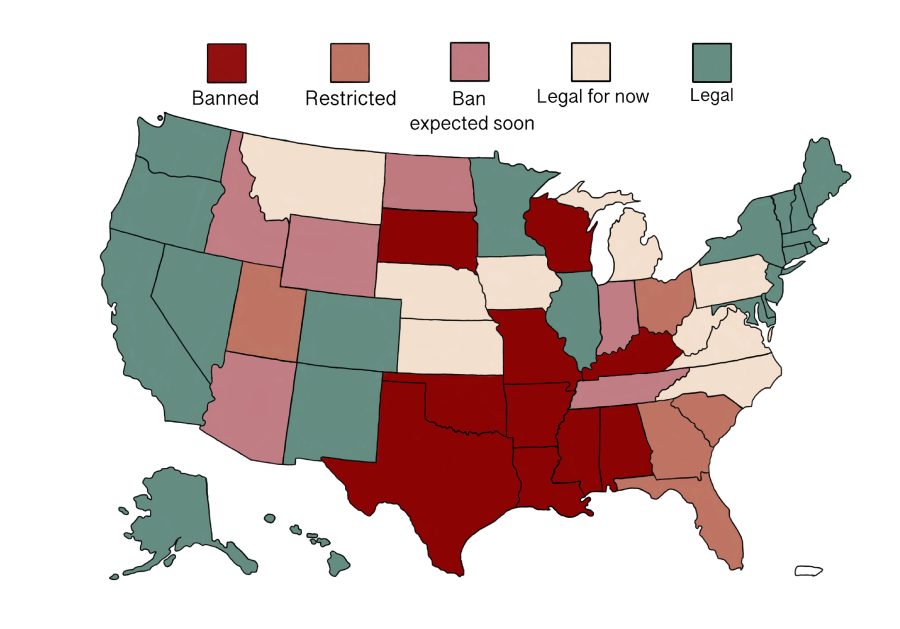Roe Reversed
A look into the implications of overturning Roe v. Wade
While the future of reproductive healthcare is still uncertain in many states, we can still make predictions about where abortion is likely to remain legal or become illegal.
Almost a year after the most restrictive ban on abortion in the US was enacted, and just months after a draft opinion overturning Roe v. Wade was leaked, the 49-year-old law protecting abortion in the United States has been overturned. Roe v. Wade secured a person’s right to abortion almost half a century ago, and, in its absence, people around the country have been left scrambling to draft new legislation, volunteer for organizations, attend marches, and everything in between. But, no matter where you stand on abortion and reproductive rights, one thing is for certain: this change will significantly affect the lives of millions of people.
Although overturning Roe doesn’t automatically prohibit the termination of a pregnancy in every state, it does mean that approximately half the US is expected to restrict abortion. This is because, in a 5-4 vote on Dobbs v. Jackson Women’s Health Organization, the Supreme Court chose to leave the decision of whether to outlaw abortion to the states themselves. The Court concluded that the right to abortion is not protected by the Constitution and shouldn’t be preserved by federal law, thus striking down Roe v. Wade and putting millions of people at risk.
While abortion rights advocates in Texas, Oklahoma, and South Dakota (among many others) are worried about the future of abortion access, some states, like California, have actually been attempting to expand abortion access. Jodi Hicks, the CEO of Planned Parenthood Affiliates of California, said in a statement,“We are working to ensure that people—regardless of where they come from—can access abortion services with as much support and as few barriers as possible.” Additionally, Governor of California Gavin Newsom recently signed a bill to protect abortion providers from bans originating from other states.
But not every state government is as concerned with protecting reproductive rights. As of August 7, Alabama, Arkansas, Missouri, and South Dakota have banned abortion with no exceptions for rape or incest; laws in Idaho, Indiana, and Tennessee are set to go into effect (or, in some cases, already have) this summer; and Ohio, South Carolina, Georgia, and Florida have heavy restrictions in place, banning abortions after six weeks (or 15 weeks, in Florida’s case). Meanwhile, the future of abortion rights is uncertain in about a dozen or so other states.
Although we have yet to see what individual states will do, History and Social Sciences teacher Mr. Matthew Valji—who also coaches Speech & Debate and Model UN—said that we can agree on what will happen on a federal level. “In the short term, neither a federal law legalizing abortion nationwide nor a federal law banning abortion nationwide is likely,” he explained. This is because, for either law to go into effect, “It would need to pass the House of Representatives and the Senate, then be signed off on by the President, and then survive the inevitable legal challenge at the Supreme Court.” Because of the ever-widening division between Democrats and Republicans and the unwillingness to cooperate with the “other side,” any collaboration is improbable. For now, every state will make its own rules.
Even though abortion providers in California are trying to help as many people from as many different states as possible, there is no guarantee that people who need abortions have the means to travel. Gas prices and plane tickets, in addition to the cost of the actual operation, are enough to keep someone pregnant due to being stuck in their home state; or even worse, enough to render them desperate enough to attempt an unsafe abortion on their own.
These laws aren’t just affecting access to reproductive healthcare, though; they are also affecting access to medication that manages severe inflammatory diseases like rheumatoid arthritis. Methotrexate, a drug that is meant to control arthritis and lupus, is being denied to people of childbearing age as it is also capable of terminating a pregnancy. Methotrexate, while not an abortion pill, is prescribed to end an ectopic pregnancy—a pregnancy that doesn’t start in the uterus and which can cause life-threatening bleeding — according to the National Institutes of Health (NIH).
Now, people like Twitter user Taylor (@_trashville) have taken to social media to share their stories of doctors refusing to prescribe the drug because of new abortion laws. Taylor, who takes the medication to manage life-threatening lupus nephritis and GvHD, announced on July 1 that she had joined, “the choir of women who have now had their methotrexate (which i have to take to you know…not die) refills denied bc it is considered an abortifacient.” She also added that she is “literally infertile now” and demanded that someone explain why “it matters if i am taking an ‘abortifacient.’” But, until laws get changed or doctors choose to risk being sued, people who have a chance of becoming pregnant are at risk of unnecessary pain.
But Ms. Lara Korneychuk, Chair of Performing Arts and leader of FEM Club, thinks that the decision to overturn Roe v. Wade could have much more dire consequences. “If we cannot right this ship, all people with uteruses will be second-class citizens,” she explained. She emphasized this point, saying that “Dead bodies who have chosen not to be organ donors currently have more protections over their organs than living people with uteruses,” referencing the pro-choice argument that if people can’t be forced to donate an organ, they shouldn’t be forced to carry a fetus inside of one.
But people with uteruses aren’t the only ones who risk becoming second-class citizens. Clarence Thomas, in his opinion supporting the overturning of Roe v. Wade, also recommended that the court re-examine Griswold, Lawrence, and Obergefell; in other words, he wants the court to reconsider legalizing contraception, sodomy, and same-sex marriage. And while it isn’t clear whether the other justices agree, Mr. Valji acknowledged, “The overruling of Roe v. Wade…increases the chance of these other precedents being overturned.”
Whether you’re a Democrat or Republican, pro-abortion or anti-abortion, in a red or a blue state, we can all agree that the overturning of Roe v. Wade will have dramatic consequences and affect the lives of millions around the United States for years to come.

Lucy is a senior and Lead Content Editor for The Tower. This is her fourth year on the staff and second on the editorial team, and she can’t wait to...







